

SN03861. Did we reclaim sovereignty from Brussels only to ignore Parliament? That really is the way to dictatorship. Elective dictatorship? The democratic mandate concept has become dangerously over-extended. Against the background of a general breakdown of public confidence in the political elite, politicians on both left and right have seen themselves not as part of a broader governing elite but as outsiders, empowered by their democratic mandate to shake up government and make it more responsive to the wishes of the people.
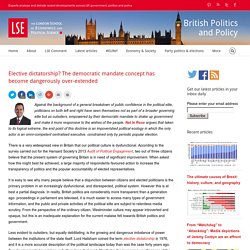
Nat le Roux argues that taken to its logical extreme, the end point of this doctrine is an impoverished political ecology in which the only actor is an omni-competent centralised executive, constrained only by periodic popular election. There is a very widespread view in Britain that our political culture is dysfunctional. According to the survey carried out for the Hansard Society’s 2013 Audit of Political Engagement, two out of three citizens believe that the present system of governing Britain is in need of significant improvement.
Long Read: Brexit, the Referendum and the UK Parliament: Some questions about sovereignty. The Leave campaign fought the referendum with the slogan of ‘taking back control’, but what does this mean in practice?
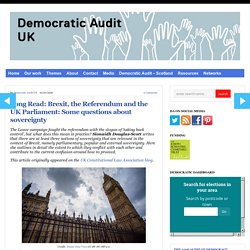
Sionaidh Douglas-Scott writes that there are at least three notions of sovereignty that are relevant in the context of Brexit, namely parliamentary, popular and external sovereignty. Here she outlines in detail the extent to which they conflict with each other and contribute to the current confusion around how to proceed. This article originally appeared on the UK Constitutional Law Association blog. So, we have the result of the Referendum, and a majority of voters have voted to leave the EU. A mantra of Leave campaigners seems to have been the desire to ‘take back control’. Government “wages war” on Parliament. This outstanding article from the Independent is an absolute must read for the UK Constitution, PM & Cabinet and Parliament topics of Unit 2 and for Democracy and Parties (and to a lesser extent elections) in Unit 1.

The Independent has suggested the Government is endeavouring to pass ‘law’ in the UK using a rule called the statutory instrument which would allow it to pass without debate. This could be used to show the danger that Government poses to Parliamentary sovereignty. The Syria vote was a triumph of parliamentary sovereignty. There are several significant angles to last night's Commons vote on Syria.
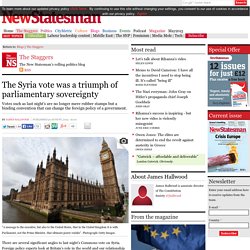
Foreign policy experts look at Britain’s role in the world and our relationship with the United States; domestic politicos look through the prism of party politics, asking who came out better between Miliband and Cameron. Meanwhile, Syria continues to suffer and we can only now hope that inaction is the lesser of two evils. But amid the fallout, easily obscured by the more obvious issues of the day, is a seismic shift in the British constitution, an evolution that has crept up quietly but which serves to empower Parliament and constrain the executive. The-independent-guide-to-the-uk-constitution-the-supremacy-of-parliament-1030... Looking around at the faces of new MPs, wandering bemused, around the Houses of Parliament over the past few weeks, it is easy to forget just what extraordinary power these individuals now hold.
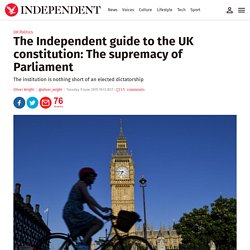
As humble new backbenchers they may not think so, but it is no exaggeration to say that collectively and constitutionally they are now members of an institution that is nothing short of an elected dictatorship. In the general humdrum reality of British political life these powers may be theoretical – but no one living in this country should be under any doubt that they are there. Take just a few examples. Parliament alone can determine what is legal and what is illegal in Britain – as well as the punishment for illegality. It can make war. When it is said that Parliament is “sovereign” it means just that. In reality, of course, how Parliament exercises its power is constrained by myriad “real-life” factors. And that is very significant. Parliamentary sovereignty. Parliamentary sovereignty is a principle of the UK constitution.
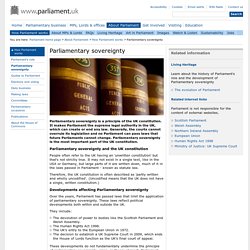
It makes Parliament the supreme legal authority in the UK, which can create or end any law. Generally, the courts cannot overrule its legislation and no Parliament can pass laws that future Parliaments cannot change.